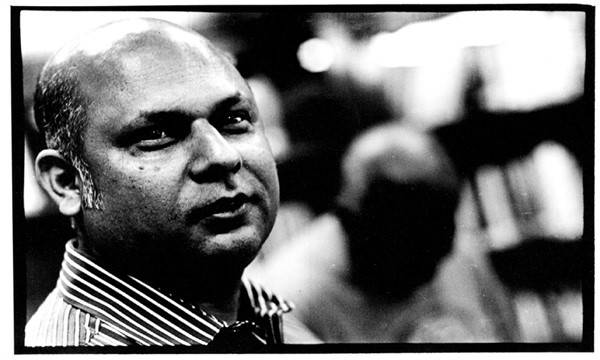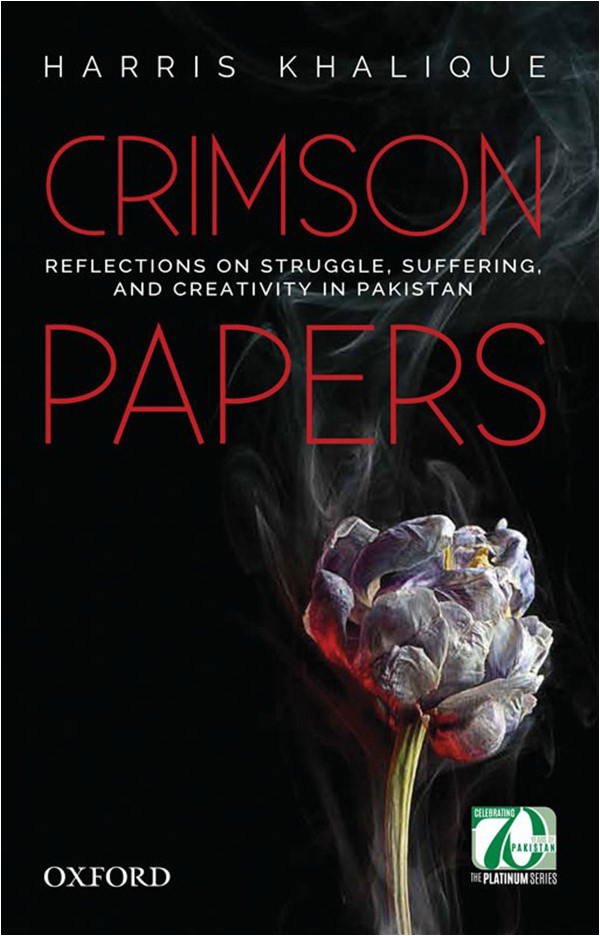
Harris Khalique is a published poet and columnist in both English and Urdu but Crimson Papers is his first book of essays. The book, which has partially come out of a sojourn at a writer’s residency at the University of Iowa, is an intensely personal series of accounts. It consists of four essays, interestingly titled Blood, Sweat, Tears and Ink. While each deals with a different aspect of Pakistan’s socio-political scene, the essays are linked by references to the author’s experiences as a left-leaning, liberal, literary figure in the country.
The first essay, Blood, is more political than the others—an overview of Pakistan’s tragic history as a state forever agonizing over security, watching over its shoulder and wary of its neighbours. The writer uses familial links with the vale of Kashmir as a lens to view this most desperate South Asian dispute, reflecting not only on his country’s fraught relationship with India, but also with the former Eastern half, now Bangladesh. As is true for all the essays, he punctuates his musings with accounts of incidents from his childhood, and encounters with friends and family, using them to illustrate how Pakistanis are viewed by suspicion in the region.
In a particularly insightful section, he draws parallels between attitudes in India and Pakistan, referring to R. K. Narayan’s thesis that imaginative writing in India stems from the Ramayana and Mahabharata, dismissing the “intervening years” prior to the departure of the British. Khalique finds this attitude similar to that of the one espoused by officially endorsed historians in Pakistan who tend to start all accounts of history with the arrival of Mohammad Bin Qasim in 712 AD.

And on a more poignant note, he also finds an association in the suffering of a soldier who spent forty years as a prisoner of war in India, and his own great-aunt, who suffered a series of misfortunes after Partition and her migration to Pakistan. Both ultimately ended up losing their mental balance during incarcerations of different sorts. These are the tragedies that the people of this unfortunate region inflict upon each other.
But there is always hope, as he exemplifies by referring to an anecdote about his Quran teacher, Ustani Ji, with which the essay ends. In spite of having lost 36 members of her family in a single day in the Partition riots, Ustani Ji finds solace in her faith, and remains resolute in her belief that there is good in human beings. Her interpretation of religion is not exclusive, but all-embracing, and her essential humanity helps her overcome her trauma.
In the second essay, Sweat, Khalique reminisces about the stalwarts of Pakistan’s Leftist movement, most of whom he got to know as a child or as a young man, through his father. Offered up are pen portraits of activists such as Dr. Aizaz Nazeer, who dedicated his life to the trade union movement, Fatehyab Ali Khan of the Mazdoor Kissan Party, the filmmaker and writer Ahmad Bashir and many others. Khalique recalls them with affection, recounting not only the story of their struggles, but also their love for life, their sense of humor and their tremendous camaraderie, which saw them through the many trials they faced. Although many luminaries of the Left have passed away, the author’s association with a similar, younger group continues to this day, although he does not say much about them. It would have been good had he added a few stories about the people who continue to lead the movement in this age of disillusionment.
The author hypothesizes that while the Left never succeeded in gaining political power in Pakistan, its relentless struggle against oppression has contributed to highlighting the debate on social and political rights, and has helped place human development at the centre of the economic agenda.
The third essay, Tears, is based on the lives of five women who personify the struggle for rights in Pakistan. Three of them, Shabana, a dancer from Swat, the architect Perween Rahman and agitator Sabeen Mahmud met violent ends at the hands of obscurantist elements and/or criminals. A fourth woman, Aasiya Bibi, who exemplifies degrees of exclusion in Pakistani society, languishes in jail. A fifth, Saeeda Bibi, is a Hazara from Quetta who has experienced a lifetime of discrimination, culminating in a son’s death in a bomb blast. Each woman’s life or death is evocative of a larger struggle in society, and each one’s sacrifice resonates far beyond her circle.
The last essay, Ink, brings the author back to his forte, poetry, in particular, and literature in general, as he paints a broad picture of post-partition literary trends in Pakistan, with a focus on modern poets. As with the other essays, this one too has some interesting personal vignettes, including one in which the author describes how he boarded a plane to Lahore to meet the reclusive poet Taufiq Rafat, only to find out from a newspaper handed out on the flight, that he had died that morning. Khalique could not bring himself to attend Rafat’s funeral, but he still manages to express some measure of the anguish he felt on that trip. Here Khalique diverges from his obvious interest in the politics of the Left a bit. It is obvious that when it comes to literature, he is more concerned with aesthetics than politics in some sense. This essay is therefore a comment on what appeals to him in a literary sense, rather than a celebration of political writing.
While some readers may disagree with some of Khalique’s views, his passion for his subjects is apparent, and he is careful to present both sides of a story where it is judicious to do so such as instances when he brings up extremism in India and Pakistan. More than anything else, the book is engagingly written and is a slim enough volume to make it ideal for a spring afternoon’s reading. It is somewhat deceptive, in that although it is a light read, parts of it stay with the reader afterwards. To that extent, the author has been successful in reaching out to a wider demographic, beyond literary circles, and has left an impression.
The writer is an independent researcher based in Islamabad
The first essay, Blood, is more political than the others—an overview of Pakistan’s tragic history as a state forever agonizing over security, watching over its shoulder and wary of its neighbours. The writer uses familial links with the vale of Kashmir as a lens to view this most desperate South Asian dispute, reflecting not only on his country’s fraught relationship with India, but also with the former Eastern half, now Bangladesh. As is true for all the essays, he punctuates his musings with accounts of incidents from his childhood, and encounters with friends and family, using them to illustrate how Pakistanis are viewed by suspicion in the region.
In a particularly insightful section, he draws parallels between attitudes in India and Pakistan, referring to R. K. Narayan’s thesis that imaginative writing in India stems from the Ramayana and Mahabharata, dismissing the “intervening years” prior to the departure of the British. Khalique finds this attitude similar to that of the one espoused by officially endorsed historians in Pakistan who tend to start all accounts of history with the arrival of Mohammad Bin Qasim in 712 AD.

And on a more poignant note, he also finds an association in the suffering of a soldier who spent forty years as a prisoner of war in India, and his own great-aunt, who suffered a series of misfortunes after Partition and her migration to Pakistan. Both ultimately ended up losing their mental balance during incarcerations of different sorts. These are the tragedies that the people of this unfortunate region inflict upon each other.
But there is always hope, as he exemplifies by referring to an anecdote about his Quran teacher, Ustani Ji, with which the essay ends. In spite of having lost 36 members of her family in a single day in the Partition riots, Ustani Ji finds solace in her faith, and remains resolute in her belief that there is good in human beings. Her interpretation of religion is not exclusive, but all-embracing, and her essential humanity helps her overcome her trauma.
In the second essay, Sweat, Khalique reminisces about the stalwarts of Pakistan’s Leftist movement, most of whom he got to know as a child or as a young man, through his father. Offered up are pen portraits of activists such as Dr. Aizaz Nazeer, who dedicated his life to the trade union movement, Fatehyab Ali Khan of the Mazdoor Kissan Party, the filmmaker and writer Ahmad Bashir and many others. Khalique recalls them with affection, recounting not only the story of their struggles, but also their love for life, their sense of humor and their tremendous camaraderie, which saw them through the many trials they faced. Although many luminaries of the Left have passed away, the author’s association with a similar, younger group continues to this day, although he does not say much about them. It would have been good had he added a few stories about the people who continue to lead the movement in this age of disillusionment.
The author hypothesizes that while the Left never succeeded in gaining political power in Pakistan, its relentless struggle against oppression has contributed to highlighting the debate on social and political rights, and has helped place human development at the centre of the economic agenda.
The third essay, Tears, is based on the lives of five women who personify the struggle for rights in Pakistan. Three of them, Shabana, a dancer from Swat, the architect Perween Rahman and agitator Sabeen Mahmud met violent ends at the hands of obscurantist elements and/or criminals. A fourth woman, Aasiya Bibi, who exemplifies degrees of exclusion in Pakistani society, languishes in jail. A fifth, Saeeda Bibi, is a Hazara from Quetta who has experienced a lifetime of discrimination, culminating in a son’s death in a bomb blast. Each woman’s life or death is evocative of a larger struggle in society, and each one’s sacrifice resonates far beyond her circle.
The last essay, Ink, brings the author back to his forte, poetry, in particular, and literature in general, as he paints a broad picture of post-partition literary trends in Pakistan, with a focus on modern poets. As with the other essays, this one too has some interesting personal vignettes, including one in which the author describes how he boarded a plane to Lahore to meet the reclusive poet Taufiq Rafat, only to find out from a newspaper handed out on the flight, that he had died that morning. Khalique could not bring himself to attend Rafat’s funeral, but he still manages to express some measure of the anguish he felt on that trip. Here Khalique diverges from his obvious interest in the politics of the Left a bit. It is obvious that when it comes to literature, he is more concerned with aesthetics than politics in some sense. This essay is therefore a comment on what appeals to him in a literary sense, rather than a celebration of political writing.
While some readers may disagree with some of Khalique’s views, his passion for his subjects is apparent, and he is careful to present both sides of a story where it is judicious to do so such as instances when he brings up extremism in India and Pakistan. More than anything else, the book is engagingly written and is a slim enough volume to make it ideal for a spring afternoon’s reading. It is somewhat deceptive, in that although it is a light read, parts of it stay with the reader afterwards. To that extent, the author has been successful in reaching out to a wider demographic, beyond literary circles, and has left an impression.
The writer is an independent researcher based in Islamabad

